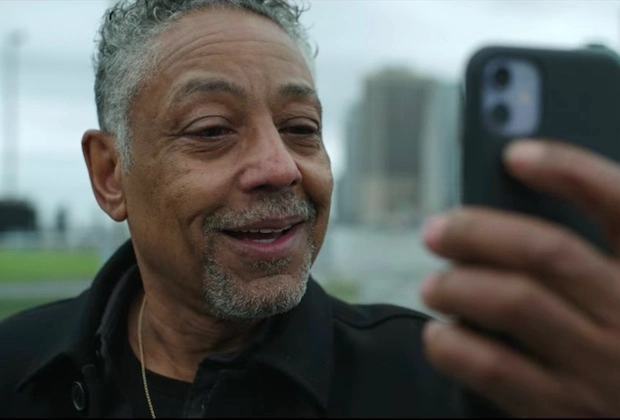PARKINSON’S DISEASE: THE FASTEST GROWING SUPPORTING CHARACTER IN HOLLYWOOD
No Sign of it “Shrinking” from the Spotlight
Credit: Netflix, AppleTV+, Amazon Studios, 20th Century Fox, FilmNation Entertainment, 30West, Imperative Entertainment, 3 Arts Entertainment, Kaling International, CBS, Nano Chameleon, Automatik Entertainment, Scott Free Productions, Netflix International Pictures, Flying Studio Pictures, Panic Pictures, Blue Light, World Productions, ITV, Fox 2000 Pictures, Regency Enterprises, New Regency, Stuber Pictures, Bedford Falls Productions, Dune Entertainment, 3 Chance Productions, Corporate Mandate, Doozer Productions, Warner Bros. Television
April 11, 2023
In recent years, Parkinson's disease (PD) has become a prominent feature in Hollywood, with many actors playing characters with the disease on both the big and small screens. From movies like Late Night and Mank, to shows such as Shrinking, Kaleidoscope, and The Good Wife, actors such as Harrison Ford, John Lithgow, and Jamie McShane have taken on the challenging roles of characters with PD.
What is the reason for the sudden increase in PD representation in Hollywood?
PD has become the darling of Tinseltown due to the disease itself, which is currently the fastest growing neurological disease in the world, affecting over ten million people globally. It is the second most common age-related neurodegenerative condition worldwide, just behind Alzheimer's disease. Recent research in North America has even revealed that PD is 50% more prevalent than previously thought.
While PD is a rising supporting character in Hollywood, its prevalence in real life is becoming more and more pronounced. This has led to increased awareness and support for Parkinson's research and advocacy groups. Earlier this year, actor Ryan Reynolds, whose father died from complications of Parkinson’s, lent support for the AppleTV+ debut of Michael J. Fox’s documentary about his career and Parkinson’s, Still: A Michael J. Fox Movie.
Getting it Right: The Challenge of Portraying Parkinson's
Portraying Parkinson’s in a respectful and believable way is a challenge. How does a show or an actor properly portray someone with a degenerative, progressive, brain disease? It's not easy.
When Grey’s Anatomy performed a breakthrough stem-cell procedure and “cured” Parkinson’s in April 2022, many people with Parkinson’s thought that in fact this was a cure. However, WebMD was among those who quickly pointed out that this was not the case.
Finding a fictional cure for Parkinson’s, no matter how possible in the long term, could be a dose of hope we all need. However, by creating a fictitious cure for PD it may only confuse the general public and possibly negatively impact the urgent need of research funds from public and private sources.
Credit: © World Productions
Bringing authenticity to the portrayal of Parkinson’s disease was of utmost importance to Irish actor Aidan Turner and the production team of the new television drama series The Suspect. Turner plays the lead character, Dr Joe O’Loughlin, a clinical psychologist who is diagnosed with early onset Parkinson’s. To accurately depict the condition on camera, Turner and the production team consulted with the charity Parkinson’s UK, which put them in touch with Drew Hallam, a musician diagnosed with Parkinson’s in 2018. Hallam’s input was critical in guiding the team on how to display the symptoms of Parkinson’s on screen while keeping them realistic.
The inclusion of a character with Parkinson’s in the hit Netflix series Kaleidoscope has drawn attention from the Parkinson’s community. The New York Times gushes, “Giancarlo Esposito’s performance in Kaleidoscope (as Leo Pap) derives much of its power from its humility, especially once (his character) breaks out of prison. We see him become increasingly frail, confronting his disease and a life full of regret.”
Credit: Netflix
As Kaleidoscope continues, we can see that Esposito really honed in on some of the true-to-life symptoms that come with Parkinson's disease. The hand tremors, spasms, slowed movement, and difficulty walking were all portrayed quite accurately. However, I can't help but point out that there's one glaring inaccuracy in the way Parkinson's is depicted in the show.
When sharing his diagnosis with a colleague, the character with Parkinson’s says he is unsure if he has “2 years or 10 years to live.” While Parkinson’s is incurable, it is not considered to be a terminal illness. The concern is the potential negative impact it can have on people's understanding of the condition. With someone being diagnosed with Parkinson’s approximately every six minutes, we need to be sure information about Parkinson’s on TV and in Movies is reflective of reality.
It is a surprising imperfection as Esposito seems to fully embrace the characters struggle, describing his character this way, “He has the brain skill, but the body’s going. In a way, that’s the tragedy of our lives. As we get older, we get more delicate and we get more fragile. I still have the brain and the sense of a younger man, but to think, ‘I have to be careful stepping off that curb,’ it’s a bitch.”
The Importance of Inclusion
There are some great examples of people with disabilities and chronic illness playing characters with disabilities and chronic illness. Some great examples include Michael J. Fox playing Louis Canning, who has Parkinson’s, on The Good Wife, RJ Mitte, who has cerebral palsy, playing Walter White Jr. who also has CP in Breaking Bad, and Lauren Potter, who has Down’s syndrome, playing the school’s head cheerleader in Glee.
Regardless, these examples are hard to come by. A recent Nielsen study completed in 2021 found that 95% of disabled parts are performed by able-bodied actors.
When actors without disabilities play characters with disabilities, it is commonly referred to as "cripping up" by critics. The term originally referred to able-bodied actors pretending to have physical disabilities, but now it also encompasses non-disabled actors playing roles with mental illnesses or intellectual disabilities, as well as neurotypical actors playing characters on the autism spectrum.
Interestingly, actors who portray characters with disabilities have a higher chance of winning Academy Awards. Over the past 35 years, almost half of the Best Actor and Best Actress winners have played characters with physical or emotional disabilities. With this in mind, 80 members of the entertainment industry wrote an open letter in 2021, urging for greater prioritization of disability representation in diversity and inclusion plans.
Although it's encouraging to see more attention being given to disability representation, it's important to ensure that the portrayals are respectful and accurate. This is especially important for conditions like Parkinson's disease, which is increasingly depicted in film and television. To achieve authenticity, it is necessary for actors to consult with people who have firsthand experience with the condition or to even consider hiring an actor with Parkinson's for the role.
Starting in 2024, the Academy of Motion Arts and Picture Sciences will introduce new standards for representation that films must meet to qualify for an Oscar in the Best Picture category. These standards include On-Screen Representation, Creative Leadership, Industry Access and Opportunities, and Audience Development.
Disabled characters are often portrayed in two problematic ways: as inspiring heroes who have "overcome" their disability or as objects of pity or ridicule. By prioritizing accurate and respectful disability representation, Hollywood can promote awareness and support for research and advocacy groups while breaking down harmful stereotypes and biases.
ACTORS WHO HAVE PORTRAYED CHARACTERS WITH PARKINSON’S
Still: A Michael J. Fox Movie
Streaming May 12, 2023 AppleTV+
Michael J. Fox* - Louis Canning, The Good Wife (2010-2016)
Harrison Ford - Dr. Richard Walker, Shrinking (2022)
John Lithgow - Walter, Late Night (2019)
Barbara Hershey - Judith, The Manor (2021)
Aidan Turner -Dr Joe O'Loughlin, The Suspect (2022)
Giancarlo Esposito - Leo Pap, Kaleidoscope (2021)
Eddie Marsan - Terry Donovan, Ray Donovan (2013-2020)
Jamie McShane - Shelly Metcalf, Mank (2020)
Anne Hathaway - Maggie Murdock, Love and Other Drugs (2010)
Alan Alda* - Bert Spitz, Marriage Story (2019)
*Diagnosed with Parkinson’s




